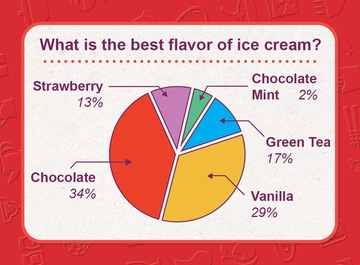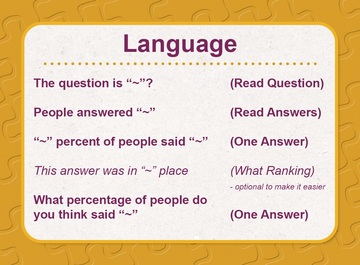


| << Do You Feel Lucky | Wham! It is So Says Japan Christmas and New Years! >> |
So Says Japan is probably our most classroomy game. It is also one of our most versatile. When we started on it as a project, we had an idea of the multiple uses it has. But now that it has been on the market for six months, we have discovered it had even more applications than we imagined.
If you haven't played it yet, allow me to quickly talk you through it. It’s game of discussion, deduction and educated guesses – a close comparison could be made to the classic game show Family Fortunes (Family Feud to our North American friends). One student will draw a card and present a question, without showing the card, to the rest of the class, group or the teacher (one beautiful point of the game is that it is completely scalable to fit class size). The card could be something like these:

Afterwards, the other students will bet on various aspects of the card and score points if they are correct. You can print the large, free, score chart from this PDF:
It's a fun game, and also a great discussion starter and a wonderful way to practice presentation skills because the game requires the student to communicate some of the information on the card. In each set of So Says Japan you will find three extracards that contain the language you need to prompt students on what to say:

However, it doesn't stop there. Here are some other ways we have learnt teachers have been using these cards.
Statistical Journalism
This was a very simple exercise but also a good one. One teacher gave a random card to each of their students and then simply asked them to write their thoughts and opinions on the survey results shown on each card. To facilitate this they showed articles from blogs, magazines and newspapers as examples of how statistics are reported in the media. The teacher gave examples of the type of language used in this type of journalism and followed it up with a discussion exercise that focused on critically thinking about how much to trust numbers and statistics. We were glad to hear about our simple game being used in such a deep way.
Compare and Contrast Essays
This sounded like a fun little project. One teacher assigned each member of the class a card from the deck. The students then had to survey their classmates to get their answers to the question. The next step involved the students writing a compare and contrast essay that looked at the similarities and differences between the answers on the card that represent Japan as a whole and the answers given by their classmates. Typical target language included phrases like:
"While pork was the most popular answer to the question ‘What do you like in your okonomiyaki?’ in Japan as a whole, in our class cheese was by far the most common answer."
I am definitely going to be using this idea in my class this semester.
Make Your Own
This is a brilliant example of project-based learning. I really don't know where some teachers find the time! Quite simply this teacher had their students choose a topic (like food and drink) that they were interested in, make 15 questions, survey as many people as they could and then turn those into new cards for the game. They then spent a class playing the game with the new cards they made. Spectacular. Topics the students came up with included Pokémon (obviously), fashion and beauty, sports, idols and singers and school life. We at Tanuki are hoping to take these surveys and turn them into free printable versions of the game you can use in your class.
Thanks for reading. If you haven't played So Says Japan yet, make sure to try out our free print-and-play version here. We have three other versions of So Says Japan in print now. You can get samples of these on our website. We also have many more on the way. Check back often for more free stuff and please get in contact if you use our games in new or interesting ways.
| << Do You Feel Lucky | Wham! It is So Says Japan Christmas and New Years! >> |


